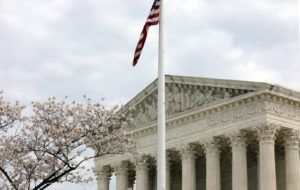
NASHVILLE (BP) — As the diversity of religious expression in the United States has grown, the number of complaints of religious discrimination in the workplace has grown as well.
A report in The Wall Street Journal in late October, for example, noted that claims of religious discrimination in the workplace have more than doubled in the past 15 years. While a higher number of sex and race discrimination complaints are handled by the government annually, the growth rate among claims of religious discrimination is far faster, The Journal reported.
Religion News Service reported in early September that a survey of more than 2,000 working Americans funded by the Tannenbaum Center for Interreligious Understanding projected that more Americans and their employers are likely to face questions of religious accommodation at work, thereby “increasing the odds for uncomfortable moments around the water cooler.”
It is not solely religious speech (such as witnessing) that raises issues of accommodation, however. Accommodation of religious practices at work is of equal concern, a fact that prompted Alliance Defending Freedom to issue a lengthy explanation of workers’ religious rights as workplace diversity increases.
The ADF guidelines, published in February 2013, come as numerous cases have been filed in the past decade over circumstances such as the wearing of hijabs by female Muslim employees and the firing of Christians who refused to work on Sunday.
The Wall Street Journal, in its report on Oct. 28, noted that companies of all sizes “are being affected by the complex intermixing of work and faith.”
“The trend toward a seven-day workweek sometimes treads on the Sabbath. Religious garb and grooming clash with dress codes. Job duties that intersect with changing public policies — for instance, issuing a marriage license to a gay couple — test some workers’ adherence to their religious beliefs,” according to The Journal.
These cases “expose the complexities of managing religion on the job,” especially as larger numbers of immigrants with non-Western beliefs join the workforce, the paper noted.
In 2012, according to The Journal, 3,811 religion-based complaints were filed with the federal Equal Employment Opportunity Commission. That number is second only to the number of cases reported in the previous year, 2011, when 4,151 EEOC complaints were lodged.
The EEOC evaluates the complaints and, in some cases, files lawsuits on behalf of workers who feel unjustly targeted for their religious beliefs, speech and expressions. The number of actual lawsuits has declined in recent years, though, chiefly because the EEOC has encouraged employers and employees to resolve complaints through mediation and education.
The high number of complaints about religious discrimination raises the question of attitudes toward religion in the workplace and the related question of how religion can be accommodated by employers and fellow employees.
In the Tannenbaum study, compiled for the New York-based organization by Public Religion Research LLC in the spring of 2013 and published in August, researchers reported that 49 percent of all non-Christians believe that employers are unconcerned with or ignorant of their religious needs in the workplace.
Fifty-nine percent of atheists, the survey found, believed employees with religious beliefs have a negative view of them because of their non-belief, but slightly more than 30 percent of non-Christian religious workers and white evangelical Protestants also felt they were viewed negatively on the job. Nearly half of all white evangelical Protestants said they had experienced or seen discrimination based on religion.
Atheists, according to the survey, are substantially more likely to report discrimination and are more likely to believe the rights of Muslims, gays and lesbians, Hispanics and women had been violated on religious grounds.
Much of the study centers on religious speech, which led researchers to make a shocking claim — that white evangelical Protestants (9 out of 10 who said they welcome religious discussions at work) may be a potential risk for increasing religious discrimination claims because of their belief that sharing the Gospel is an essential act of obedience in the Christian faith.
“White evangelical Protestants report sharing their religious beliefs with coworkers much more often than workers with other religious backgrounds,” the study noted. “Half (50%) of all white evangelical Protestants say they share their religious beliefs with other coworkers occasionally. By contrast, only 19% of non-Christian religious workers, 17% of Catholics, 15% of atheists, and 12% of white mainline Protestants report sharing their religious beliefs with coworkers occasionally.”
The survey cites the increasing number of workers who claim no religious affiliation. These “Nones,” as the survey identifies them, include atheists and agnostics but also people who believe in God without participating in organized religion.
“From our benchmarking, we observe that people from this group are emerging in the public forum and are beginning to be heard. And, from the survey, we know that many atheists and agnostics/seculars feel uncomfortable when religion comes up as a subject at work. This suggests the potential for workplace clashes between atheists and evangelical Protestants, given that half of all evangelical Protestants report that they share their religious beliefs with coworkers occasionally,” the study said.
That notion is one that WORLD Magazine’s Sarah Padbury rejected in the days following the publication of the study.
Padbury, in a Sept. 6 column, wrote an equal number of workers of all faiths and non-faiths were reported by the study as having had conversations about religion while at work. When it comes to “sharing” personal religious viewpoints, however, evangelicals are, in fact, much more likely to understand a conversation about any number of topics as “religious” because of their Christian worldview.
“An atheist and his evangelical coworker discuss their teens’ science projects during a break. The atheist mentions a volcano project that shows how the layers of earth were formed over millions of years. The latter talks about a project showing the moon is young, proof of creation. To the atheist, only the evangelical has shared his religious beliefs. But to the evangelical, they both did,” Padbury wrote.
She added, “It is also possible the percentage of religious discussions is higher for evangelicals because they talk to other evangelicals about their faith, and the low percentages of other faiths represent a small number of aggressive coworkers who start conversations with many evangelicals.”
Padbury noted the Tannenbaum survey’s suggestion of diversity training for those who hold to evangelical Christian practices, but warned that Christians will be “hard pressed to comply” if diversity training means abandoning a verbal witness to the Gospel.
The guidelines issued by the Alliance Defending Freedom pointed to an opinion set forth by the Third Circuit Court of Appeals describing Title VII of the Civil Rights Act of 1964 as plainly intending “to relieve individuals of the burden of choosing between their jobs and their religious convictions” as part of “our ‘happy tradition’ of avoiding unnecessary clashes with the dictates of conscience.”
Defining what that means, however, can be difficult amid a diversity of religious opinions. Can an employee be terminated by his atheist employer for refusing to work on Sunday? Can a Jew be denied a holiday for the observance of Yom Kippur while Christians are granted holidays for the observance of Christmas?
ADF answers that employers are required to make “reasonable accommodations” to allow employees freedom of religious practice, assuming that freedom does not harm the business or government entity.
ADF noted in its guidelines that there must be clear evidence that the employee’s practice is the result of a sincerely held belief. If so, the practice must be accommodated, ADF stated.
However, “failure to act on a religious belief consistently may be considered evidence that the belief is not sincerely held.”
“Where the asserted religious belief is found to be merely personal preference, the employee’s claim may fail,” ADF noted.
Once an employee demonstrates that his actions are based on a sincerely held religious belief, according to ADF’s interpretation of multiple legal cases, it is then the employer’s responsibility to accommodate religious practice.
The employer is required to accommodate an employee but does “not necessarily have to accommodate an employee’s religious practice in a way the employee would prefer.”
Even “aggressive proselytizing” may be acceptable behavior on the part of an employee, provided it does not prohibit the fulfillment of one’s duties, ADF noted in its guidelines. The sharing of a faith is not acceptable when religious speech becomes “so confrontational it inhibits the cooperation of other employees.”
Likewise, employers or supervisors are allowed to express their religious viewpoints as long as they are “careful to avoid giving employees the impression that advancement or continued employment is dependent upon acquiescence to the employer’s religious belief.”
ADF’s guidelines summarize: “Under Title VII and corresponding state statutes, employers must accommodate the sincerely held religious beliefs of their employees. ‘Religious belief’ is interpreted broadly and includes expression, refusing to work on the Sabbath, and refusing to perform tasks which are contrary to religious convictions. An employer can be excused from its affirmative duty to accommodate only if the employer can show that accommodation would result in undue hardship. Undue hardship must be provable, and not based on hypothetical situations.”
A federal Workplace Religious Freedom Act was introduced in the Senate by then-Sens. Rick Santorum, R.-Pa., and John Kerry, D.-Mass., in 2005. The bill was referred to committee and languished there after Santorum lost his re-election bid to the Senate. A slightly altered version of the bill was introduced again by Kerry in 2012.
That law, if passed, will clarify what accommodations employers must make in order to alleviate religious conflict in the workplace over religious clothing (including jewelry) and hairstyles and over situations such as time-off requests during religious seasons.
In the act, the accommodation is not considered “reasonable” unless it “removes conflict between employment requirements and the religious practice of the employee.” The act protects a religious employee from segregation and clarifies the standards employers must meet in order to demonstrate the “undue hardship” on their business created by an employee’s religious observances, speech or activities.
The most recent bill has not been taken up by another senator following Kerry’s confirmation as Secretary of State.
More than 20 states have instituted laws protecting religious freedom in the workplace. California’s law, which took effect in January 2013, lowers the bar for employees to sue over claims of religious discrimination.
For the Alliance Defending Freedom guide on religious rights in the workplace, go to: https://www.alliancedefendingfreedom.org/content/docs/issues/school/The-Rights-of-Religious-Employees-3.22.13.pdf.
–30—
Gregory Tomlin is a writer in Fort Worth, Texas. Get Baptist Press headlines and breaking news on Twitter (@BaptistPress), Facebook (Facebook.com/BaptistPress) and in your email (baptistpress.com/SubscribeBP.asp).













